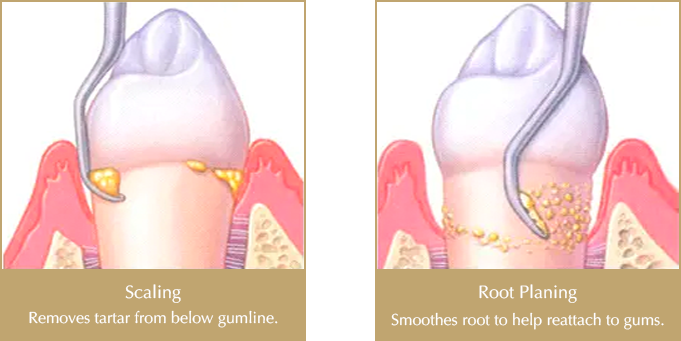Deep Cleaning
Sometimes a routine dental cleaning isn’t enough. If you have bleeding gums, receding gums, or loose teeth, your dentist may recommend deep cleaning—also called periodontal scaling and root planing. A deep cleaning can remove a buildup of plaque and tartar on your teeth, reducing gum inflammation, and improving gum health.
Plaque is a sticky film that builds on teeth. It contains bacteria and develops when food particles mix with saliva. You can remove plaque by brushing your teeth after every meal. However, brushing doesn’t remove plaque in between your teeth. Which is why it’s necessary to also floss.
When plaque hardens, it becomes calculus. The accumulation of plaque or calculus can lead to gum disease. This includes gingivitis, which is gum inflammation. And if left untreated, it can develop into periodontitis. This is a serious infection that destroys bone that support your teeth.
Deep Cleaning Treatments: Scaling and Planing
1. Periodontal Scaling
When scaling is performed, plaque and tartar are removed from the surface of your teeth. The process especially targets the area below your gum line along the root. Scaling is performed with a precision dental instrument called an ultrasonic scaler. This may include an irrigation process that can be used to deliver antimicrobial agents below the gum line to help reduce oral bacteria.
2. Root planing
Root planing is performed in order to remove cementum and surface dentin that is embedded with tartar, toxins, and microorganisms. The root of the tooth is smoothed, which allows for healing, and also prevents bacteria from easily colonizing the area.

What does deep cleaning teeth involve?
We will only perform scaling and root planing after a comprehensive oral examination. Depending on the condition of your gums, the amount of tartar present, the depth of the pockets (spaces between gum and teeth), and the progression of periodontitis, we may recommend scaling and root planing. In some cases, local anesthesia may be given to minimize discomfort.
Antibiotics or irrigation with antimicrobials (chemical agents or mouth rinses) may be recommended to help stop the growth of bacteria that create these acid-producing toxins that lead to periodontitis. In some instances, we may place antibiotics into the periodontal pockets after scaling and planing. This may be done to manage infection and promote routine healing.
When there are deep pockets (spaces) between teeth and gums, it is difficult to thoroughly remove plaque and calculus. It is very rare for patients to keep these pockets clean and plaque free. Because of that, you may be required surgery to restore your periodontal health.
What are the benefits of deep cleaning?
Scaling and planing helps prevent periodontal disease from forming or worsening. Cardiology research has shown that bacteria from periodontal disease can travel through your blood stream and affect other areas of your body, leading to cardiovascular or respiratory disease. And in some cases, this can actually be fatal. Scaling and planing removes the bacteria that causes the deadly conditions.
Scaling and planing also protect you from tooth loss. When a gum pocket exceeds 3mm in depth, the risk of periodontal disease increases dramatically. As pockets deepen, more bacteria are able to colonize and grow, which eventually leads to a chronic inflammatory response by the body that damages and destroys gingival and bone tissue. Which leads to tooth loss.
Scaling and planing also reduces bad breath stemming from an accumulation of bacteria in your oral cavity, and they also remove superficial teeth stains.
This article is intended to promote understanding of and knowledge about general oral health topics. It is not intended to be a substitute for professional advice, diagnosis or treatment. Always seek the advice of your dentist or other qualified healthcare provider with any questions you may have regarding a medical condition or treatment.